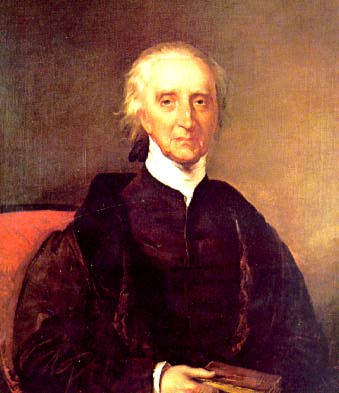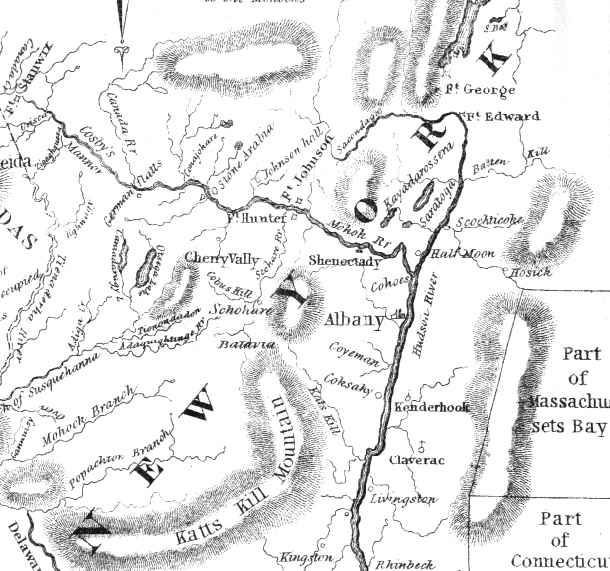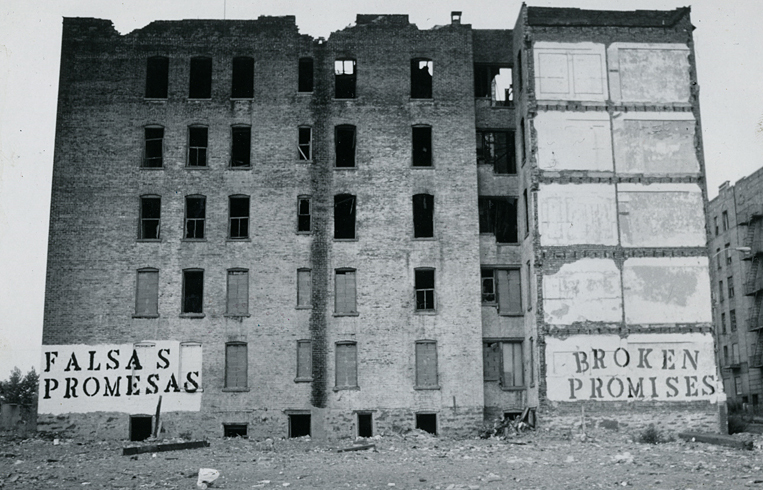|
Arbor Hill, Albany, New York
Arbor Hill is a neighborhood in Albany, New York, generally defined as the area from Clinton Avenue north to Tivoli Hollow and the Livingston Avenue Railroad Bridge and from Broadway west to Henry Johnson Boulevard. Both Clinton Avenue and Henry Johnson Boulevard are signed as U.S. Route 9. It was outside Albany's first boundaries as set up in the Dongan Charter of 1686. The original name of the area was Colonie (which is applied now to the current town to the north), and the area was incorporated under that name as a village in 1804; it was annexed by Albany in 1815. There are two sub-neighborhoods in Arbor Hill, Dudley Heights and the Ten Broeck Triangle. "Arbor Hill" was the name given to the Ten Broeck estate; the Ten Broeck Mansion is still an important cultural and historical museum. The neighborhood has other historical and cultural sights such as the Palace Theatre and St. Joseph's Church. Demographically it is predominantly African-American. History The Albany neig ... [...More Info...] [...Related Items...] OR: [Wikipedia] [Google] [Baidu] |
Administrative Divisions Of New York
The administrative divisions of New York are the various units of government that provide local government, local services in the New York (state), State of New York. The state is divided into boroughs of New York City, boroughs, counties, cities, civil township, townships called "towns", and villages. (The only boroughs, the five boroughs of New York City, have the same boundaries as their respective counties.) They are municipal corporations, chartered (created) by the New York State Legislature, as under the New York Constitution the only body that can create governmental units is the state. All of them have their own governments, sometimes with no paid employees, that provide local services. Centers of population that are not incorporated and have no government or local services are designated Hamlet (place)#New York, hamlets. Whether a municipality is defined as a borough, city, town, or village is determined not by population or land area, but rather on the form of gover ... [...More Info...] [...Related Items...] OR: [Wikipedia] [Google] [Baidu] |
Irish-American
, image = Irish ancestry in the USA 2018; Where Irish eyes are Smiling.png , image_caption = Irish Americans, % of population by state , caption = Notable Irish Americans , population = 36,115,472 (10.9%) alone or in combination 10,899,442 (3.3%) Irish alone 33,618,500(10.1%) alone or in combination 9,919,263 (3.0%) Irish alone , popplace = Boston New York City Scranton Philadelphia New Orleans Pittsburgh Cleveland Chicago Baltimore Detroit Milwaukee Louisville New England Delaware Valley Coal Region Los Angeles Las Vegas Atlanta Sacramento San Diego Houston Dallas San Francisco Palm Springs, California Fairbanks and most urban areas , langs = English ( American English dialects); a scant speak Irish , rels = Protestant (51%) Catholic (36%) Other (3%) No religion (10%) (2006) , related = Anglo-Irish people Breton Americans Cornish Americans English Americans Irish ... [...More Info...] [...Related Items...] OR: [Wikipedia] [Google] [Baidu] |
Arbor Hill Historic District–Ten Broeck Triangle
The Arbor Hill Historic District–Ten Broeck Triangle, originally the Ten Broeck Historic District, is a seven-block area located within the Arbor Hill neighborhood north of what is today downtown Albany, New York, United States. In 1979 its easternmost third, the Ten Broeck Triangle, the second oldest residential neighborhood in the city, was recognized as a historic district and listed on the National Register of Historic Places. Four years later, the district was increased to its current size and renamed to reflect its expansion to include some of the rest of Arbor Hill. The future district was first established by its oldest contributing property, the Ten Broeck Mansion, built at the end of the 18th century by a prominent local family. It lent its name to the Ten Broeck Triangle, established in the middle of the following century when successful businessmen, primarily lumber dealers, built large houses along Ten Broeck Avenue with the fortunes they had made from trade on t ... [...More Info...] [...Related Items...] OR: [Wikipedia] [Google] [Baidu] |
West Hill, Albany, New York
The neighborhoods of Albany, New York are listed below. Arbor Hill Arbor Hill is an historic neighborhood in northeastern Albany near the Hudson River. Arbor Hill encompasses the area from Clinton Avenue (formerly called Patroon Street) north to the Livingston Avenue Railroad Bridge (where North Albany begins) and from the Hudson River west to Henry Johnson Boulevard. Arbor Hill was outside Albany's first boundaries as set up in the Dongan Charter of 1686. The original name of the area was Colonie. Incorporated as a village on April 9, 1804, Arbor Hill was annexed by the city in 1815, at which time Patroon Street became Clinton Avenue. The name "Arbor Hill" comes from the nickname of the Ten Broeck Mansion, an important cultural and historical destination in the neighborhood. Arbor Hill includes Dudley Heights, a residential neighborhood north of Livingston Avenue that was the first location of the Dudley Observatory. Demographically, Arbor Hill is predominantly African-America ... [...More Info...] [...Related Items...] OR: [Wikipedia] [Google] [Baidu] |
Sheridan Hollow, Albany, New York
Sheridan Hollow is a neighborhood in Albany, New York located in a ravine north of Downtown Albany. Capitol Hill to the south and Arbor Hill to the north flank the ravine. Often the neighborhood is overlooked by city residents, and outsiders who work in the neighborhood often don't recognize the name of the neighborhood. This is due to the identity of the Hollow being subsumed into its larger neighbor Arbor Hill, for instance news stories of events are often accredited to the wrong neighborhood. Being on undesirable land for development in colonial times, growth was slow in the Hollow and the neighborhood was populated through the centuries by a series of ethnic groups new to Albany, such as the Irish, Polish, and African Americans. History The Vossenkill or Vozenkill was the kill that formed the ravine; kill being Dutch for creek. The creek was named for Andries de Vos, an early settler, and in the late-1700s the name was anglicized to Foxes Creek or Foxenkill. The creek and a ... [...More Info...] [...Related Items...] OR: [Wikipedia] [Google] [Baidu] |
North Albany, Albany, New York
North Albany is a neighborhood in the city of Albany, New York. North Albany was settled in the mid-17th century by the Patroon of Rensselaerswyck and his tenants and later became a hamlet in the town of Watervliet. Due to the Erie Canal being constructed in 1825, North Albany saw immense growth, with the Albany Lumber District and an influx of Irish immigrants lending the area the name of ''Limerick''. Home to many historic warehouses and row houses, North Albany continues to be an important industrial neighborhood. Recent efforts have begun to gentrify the neighborhood by adapting heavy industry/warehouse use to artistic and entertainment venues, such as a German beer garden, an amusement park, live music venues, and arts and crafts marketplaces. History The area of North Albany was originally woodland and farmland as part of the patroonship of Rensselaerswyck, a feudal land patent covering present-day Albany and Rensselaer counties. In 1654 Barent Pietersen Coeymans and T ... [...More Info...] [...Related Items...] OR: [Wikipedia] [Google] [Baidu] |
Capital District, New York
The Capital District, also known as the Capital Region, is the metropolitan area surrounding Albany, the capital of the U.S. state of New York. The Capital District was first settled by the Dutch in the early 17th century and came under English control in 1664. Albany has been the permanent capital of the state of New York since 1797. The Capital District is notable for many historical events that predate the independence of the United States, including the Albany Plan of Union and the Battles of Saratoga. Etymology The earliest known reference to the name "Capital District" stems from a Capital Police District that was created in the Albany area in the late 1860s. In the 1910s, several economic and government organizations covering the area used "Capital District" in their name, such as the Capital District Conference of Charities and Corrections in 1913, the Capital District Life Underwriters Association also in 1913, and the Capital District Recreation League. The Capi ... [...More Info...] [...Related Items...] OR: [Wikipedia] [Google] [Baidu] |
Charter School
A charter school is a school that receives government funding but operates independently of the established state school system in which it is located. It is independent in the sense that it operates according to the basic principle of autonomy for accountability, that it is freed from the rules but accountable for results. Public vs. private school Charter schools are publicly funded through taxation and operated by privately owned management companies. Charter schools are often established, operated, and maintained by for-profit organizations, and are not necessarily held to the same standards as traditional public schools. There is debate on whether charter schools should be described as private schools or state schools. Advocates of the charter model state that they are public schools because they are open to all students and do not charge tuition. Critics of charter schools assert that charter schools' private operation with lack of public accountability makes them mo ... [...More Info...] [...Related Items...] OR: [Wikipedia] [Google] [Baidu] |
Small Incendiary Device
Incendiary weapons, incendiary devices, incendiary munitions, or incendiary bombs are weapons designed to start fires or destroy sensitive equipment using fire (and sometimes used as anti-personnel weaponry), that use materials such as napalm, thermite, magnesium powder, chlorine trifluoride, or white phosphorus. Though colloquially often known as bombs, they are not explosives but in fact are designed to slow the process of chemical reactions and use ignition rather than detonation to start or maintain the reaction. Napalm for example, is petroleum especially thickened with certain chemicals into a 'gel' to slow, but not stop, combustion, releasing energy over a longer time than an explosive device. In the case of napalm, the gel adheres to surfaces and resists suppression. Pre-modern history A range of early thermal weapons were utilized by ancient, medieval/post-classical and early modern armies, including hot pitch, oil, resin, animal fat and other similar compounds. Sub ... [...More Info...] [...Related Items...] OR: [Wikipedia] [Google] [Baidu] |
African-American
African Americans (also referred to as Black Americans and Afro-Americans) are an Race and ethnicity in the United States, ethnic group consisting of Americans with partial or total ancestry from sub-Saharan Africa. The term "African American" generally denotes descendants of Slavery in the United States, enslaved Africans who are from the United States. While some Black immigrants or their children may also come to identify as African-American, the majority of first generation immigrants do not, preferring to identify with their nation of origin. African Americans constitute the second largest racial group in the U.S. after White Americans, as well as the third largest ethnic group after Hispanic and Latino Americans. Most African Americans are descendants of enslaved people within the boundaries of the present United States. On average, African Americans are of West Africa, West/Central Africa, Central African with some European descent; some also have Native Americans in th ... [...More Info...] [...Related Items...] OR: [Wikipedia] [Google] [Baidu] |
History Of Albany, New York (1983–present)
The history of Albany, New York from 1983 to present begins with the death of Erastus Corning 2nd, Albany's longest serving mayor. When Corning died in 1983, Thomas Whalen assumed the mayorship and was reelected twice. Albany saw a significant influx of federal dollars earmarked for restoring historic structures. What Corning had saved from destruction, Whalen refurbished.McEneny (2006), p. 191 The Mayor's Office of Special Events was created in an effort to increase the number of festivals and artistic events in the city, including a year-long ''Dongan Charter'' tricentennial celebration in 1986.McEneny (2006), p. 192 Whalen is credited for an "unparalleled cycle of commercial investment and development" in Albany due to his "aggressive business development programs". Prior to the recession of the 1990s, Albany was home to two Fortune 500 companies: KeyBank and Fleet Bank; both have since moved or merged with other banks.McEneny (2006), p. 193 Albany saw its political climate c ... [...More Info...] [...Related Items...] OR: [Wikipedia] [Google] [Baidu] |
White Flight
White flight or white exodus is the sudden or gradual large-scale migration of white people from areas becoming more racially or ethnoculturally diverse. Starting in the 1950s and 1960s, the terms became popular in the United States. They referred to the large-scale migration of people of various European ancestries from racially mixed urban regions to more racially homogeneous suburban or exurban regions. The term has more recently been applied to other migrations by whites, from older, inner suburbs to rural areas, as well as from the U.S. Northeast and Midwest to the milder climate in the Southeast and Southwest. The term 'white flight' has also been used for large-scale post-colonial emigration of whites from Africa, or parts of that continent, driven by levels of violent crime and anti-colonial or anti-white state policies. Migration of middle-class white populations was observed during the civil rights movement in the 1950s and 1960s out of cities such as Cleveland, ... [...More Info...] [...Related Items...] OR: [Wikipedia] [Google] [Baidu] |









